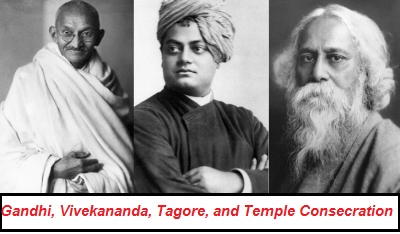The upcoming consecration of the Ram Temple on January 22 in Ayodhya, at the very site where the historic Babri Mosque stood, reflects a stark contradiction to the ideals championed by Swami Vivekananda, Rabindranath Tagore, and Mahatma Gandhi. This consecration, permitted by the Supreme Court despite acknowledging the egregious violation in the demolition of the mosque, would undoubtedly leave these iconic figures deeply anguished.
Gandhi’s Vision of Temple Consecration
When Mahatma Gandhi opened the Lakshmi Narayan Temple in Delhi on March 18, 1939, eighty-five years ago, he emphasized the temple’s importance in promoting religious diversity and rejecting communal hate. Gandhi intended for temples to serve as tools for promoting respect for all religions in order to end interfaith conflict and jealousy.
Vivekananda’s Pride in Building for Other Faiths
Preceding Gandhi, Swami Vivekananda, after his transformative visit to America in 1897, expressed pride in Hindus building churches for Christians and mosques for Muslims in India. His call for universal toleration and active assistance between religious communities remains profoundly relevant today, challenging the current state apparatus to reflect on the values of religious acceptance.
Tagore’s Poetic Critique on Empty Religiosity
In a poetic response to the consecration, Rabindranath Tagore’s 1923 composition, ‘Deeno Daan,’ questions the true essence of a shrine. Through a saint’s dialogue with a king, Tagore asserts that a temple, adorned with gold and gems, can be empty of true spirituality and filled with royal pride. Tagore’s lines serve as a timeless reminder of the importance of humility and charity in religious practices.
Lesson for Today’s Rulers
The words of Vivekananda, Tagore, and Gandhi hold profound lessons for the current state apparatus in India, especially those who invoke Vivekananda’s ideals. In the face of the forthcoming temple consecration and the rising religious fervor, the values of religious tolerance advocated by these luminaries should not be overlooked.
S.N. Sahu, who served as an officer on special duty to President K.R. Narayanan, prompts us to ponder whether today’s rulers can glean essential lessons from the teachings of Vivekananda, Tagore, and Gandhi. The consecration of a shrine or temple, stripped of the ruler’s pride, should embody the true spirit of charity and empathy toward all faiths.
Also Read:
